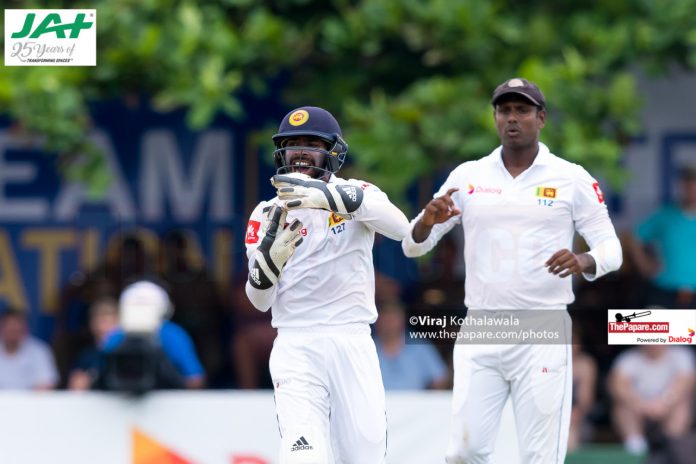Sri Lanka’s choice of reviews in the opening Test match against England in Galle has been the bone of contention after a few contentious calls by the players . The foremost thing to remember is that reviews are there to avoid the ‘howlers’, but teams tend to take their chances if they believe there’s a slight chance to make a breakthrough or to survive in the case of batsmen. The introduction of Umpires’ Call, seems to have changed the equation.
True that it is the captain who decides what to review and not. But often he is not in the best position to make the call and wicketkeepers are given more freedom to decide which decision should go upstairs.
In Sri Lanka’s case, it is Niroshan Dickwella who gives the captain feedback on what to do with reviews. He had got one decision wrong when he over enthusiastically appealed for a caught behind decision and then pushed the captain to review Keaton Jennings for caught behind in the 12th over of first innings. The batsman was given not out and that seemed to have dented Dickwella’s confidence somewhat in later reviews. In the first innings, Sri Lanka lost both reviews even before Rangana Herath, their best bowler was introduced to the attack.
Mistakes do happen and Dickwella needs to be given the assurance to make a call on reviews. He needs to be told not to get carried away by the excitement and emotions bowlers show. A bowler wants every not out decision reviewed. Someone with a balanced opinion like Angelo Mathews, who fields at slip should help Dickwella to assess calls prudently.
In England’s second innings, Sri Lanka didn’t review an lbw shout with Keaton Jennings on 58. Had Sri Lanka reviewed, Jennings would have been given out, but Dickwella although had the instincts did not have the conviction to call for it due to his mistake in the first innings. Jennings went onto make an unbeaten 146. A crucial knock for his side that put the game beyond Sri Lanka’s reach.
When you are batting, it is the non-striker who gives you the nod whether a decision should be reviewed or not. In the Galle Test, both openers got it terribly wrong as Dimuth Karunaratne reviewed a caught behind decision and Kaushal Silva used one cheaply when he was given out leg before wicket to a straight ball from Jack Leach.
In Sri Lanka’s second innings, when Dhananjaya de Silva was given out caught behind, they had a review left and the batsman was able to use it. Not that it mattered as Dhananjaya was dismissed the next ball. But often having reviews at hand become handy. Remember Lord’s 2014?
It appeared England had pulled off a sensational win in the penultimate ball of the game when Nuwan Pradeep was given out leg before wicket to Stuart Broad by umpire Paul Reiffel. Pradeep reviewed and it emerged that there had been a huge inside edge. He survived and Sri Lanka drew the game and created history in the next Test in Headingley, another last ball thriller that helped them to win their first series in England.
There have been some horror reviews by Sri Lankans in the past and the worst perhaps is when a former captain made the ‘t’ sign after he offered a return catch in Cardiff.
The Decision Review System (DRS) was first introduced in 2008 in a series involving Sri Lanka. India were touring the island and the ICC had introduced the DRS on a trial basis. There was some opposition as some argued that the authority of the umpires was being undermined.
David Richardson, who was the General Manager of the ICC at that point addressed the media at SSC and when journalists questioned him on the need to introduce DRS, he justified the introduction of the module saying that the ICC didn’t want to see the effigies of Steve Bucknor being burned in the streets of Calcutta.
Sri Lanka had done their homework and captain Mahela Jayawardene used the DRS expertly but his opposite number Anil Kumble was not so clever. This was the series where Ajanntha Mendis claimed 26 wickets breaking Sir Alec Bedser’s record for most wickets in a series by a debutant. The record had stood for 62 years.
India were not so pleased with the outcome of the series and felt that the DRS had helped the opposition considerably. But the truth of the matter was that the Sri Lankan skipper was smart in using his reviews. The story was that Sachin Tendulkar opposed the DRS and the ICC instead of making it mandatory tweaked the rules to say that the system can be only in place if both teams competing in the series agreed.
The DRS has gone through several changes. At the start there were no umpires’ calls. There were three reviews per side as opposed to the two at present. After 80 overs, if teams had exhausted reviews, they were reinstated unlike the case today. It is better to have just two reviews as too much of it will see the system abused and lot of time being consumed. Already teams like Sri Lanka are having major issues with slow over rates and three of their captains have been suspended in the last 15 months.














